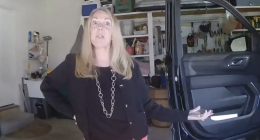
Global volleyball superstar Paola Egonu’s comments this weekend about quitting the Italian national team over racist abuse has prompted a wave of solidarity on social media as well as a debate over racism in the country’s sports community.
In a video posted online by a fan on Saturday after Italy won the women’s world championship bronze medal against the United States, the Black athlete is heard telling her agent: “This is my last game with the national team.”
“You can’t understand,” she said. “They still ask me why I am Italian.”
The 23-year-old did not specify who she was referring to, but Italian volleyball federation head Giuseppe Manfredi told local media that Egonu was racially abused on social media after Italy lost Thursday’s semi-final against Brazil.
In a statement commenting on Egonu’s remarks, Manfredi expressed his sorrow for the attacks and noted that Egonu had represented Italy at all levels.
In an interview with Sky News after the publication of the video, Egonu toned down her intention about retiring from the national team, saying instead she was looking forward to taking a break. Nonetheless, she stressed the reason behind her decision was due to being the target of racist comments among other issues.
“To think that I have read people asking me why I am Italian makes me wonder why I should represent these kinds of people,” she said.
Egonu, one of the world’s best players, has long been praised for being a key member of the national team, but she’s also been a frequent target of criticism following some of the team’s losses.
🇮🇹🏐 Piena solidarietà alla campionessa di volley Paola #Egonu dal Presidente Draghi nella telefonata di questa mattina. L’atleta azzurra è un orgoglio dello sport italiano, avrà future occasioni per vincere altri trofei indossando la maglia della Nazionale pic.twitter.com/ZZnWLnhM3P
— Palazzo_Chigi (@Palazzo_Chigi) October 16, 2022
Translation: Full solidarity with the volleyball champion Paola Egonu from President Draghi in a phone call this morning. The athlete is a source of pride to Italian sport. She will have future opportunities to win other trophies wearing the national team jersey.”
On Sunday, Italy’s outgoing Prime Minister Mario Draghi called Egonu to express his support, and his office described the athlete on Twitter as a “source of pride to Italian sport” who “will have future opportunities to win other trophies wearing the national team jersey”.
Many fans and other politicians also took to social media to express their solidarity with Egonu.
“Dear Paola, it’s called racism, they are called racists and they hurt,” Elena Bonetti, the outgoing minister of equal opportunities, wrote on Twitter.
Cara Paola, si chiama razzismo, si chiamano razzisti, e fanno tanto male. Ma tu non sei sola: è la nostra lotta, e come tu insegni a tutti noi dal campo, insieme siamo forti e vinciamo.
Viva l’Italia, e viva la nostra meravigliosa Paola Egonu 🇮🇹 https://t.co/qNsDO7lIgd
— Elena Bonetti (@elenabonetti) October 15, 2022
Translation: Dear Paola, it’s called racism, they are called racists and they hurt. But you are not alone: this is our fight and as you teach us from the field, together we are strong and we win. Long live Italy and long live our splendid Paola Egonu.
Others, however, disagreed.
“Paola, this time it’s not about your skin, but stress,” was the title of an article by journalist Riccardo Signori in the Italian newspaper Il Giornale.
For Nicola Sbetti, professor of sports and international relations at the University of Bologna, the denial of racism as one of the reasons behind Egonu’s comments was part of the problem.
“The racial issue is the big elephant in the room, which a good section of society prefers not to see and face in the sporting world,” Sbetti said.
“There is systemic racism in Italy, and it’s easier that it emerges in sports against Afro-descendent athletes because that is where their talent emerges before other sectors as it is a more meritocratic platform where the best emerges.”
Italian sports has long been plagued with racism.
In 2017, striker Mario Balotelli, who was born in the southern city of Palermo to Ghanaian parents, was racially abused by fans of the national football team during a match against Romania.
Offences linked to an athlete’s ethnicity, national origin or facial features represent 80 percent of discriminatory attacks registered by the National Observatory against Discrimination in Sport, according to its director, Luigi Manconi.
“It’s an element that is present in sports that needs to be fought against,” Manconi said. “We always need to maintain high vigilance.”
The debate has erupted at a sensitive time in Italian politics as the issue of human rights – especially around the treatment of minorities, migrants and LGBTQ communities – became a focus of Italy’s electoral campaign in September, which culminated in an election victory for a hard-right coalition.
Critics have expressed fears that the new government, led by Prime Minister Giorgia Meloni, the leader of the Brothers of Italy party, could indirectly pave the way for racist and homophobic behaviours to be tolerated.
Read More: World News | Entertainment News | Celeb News
Aljazera







